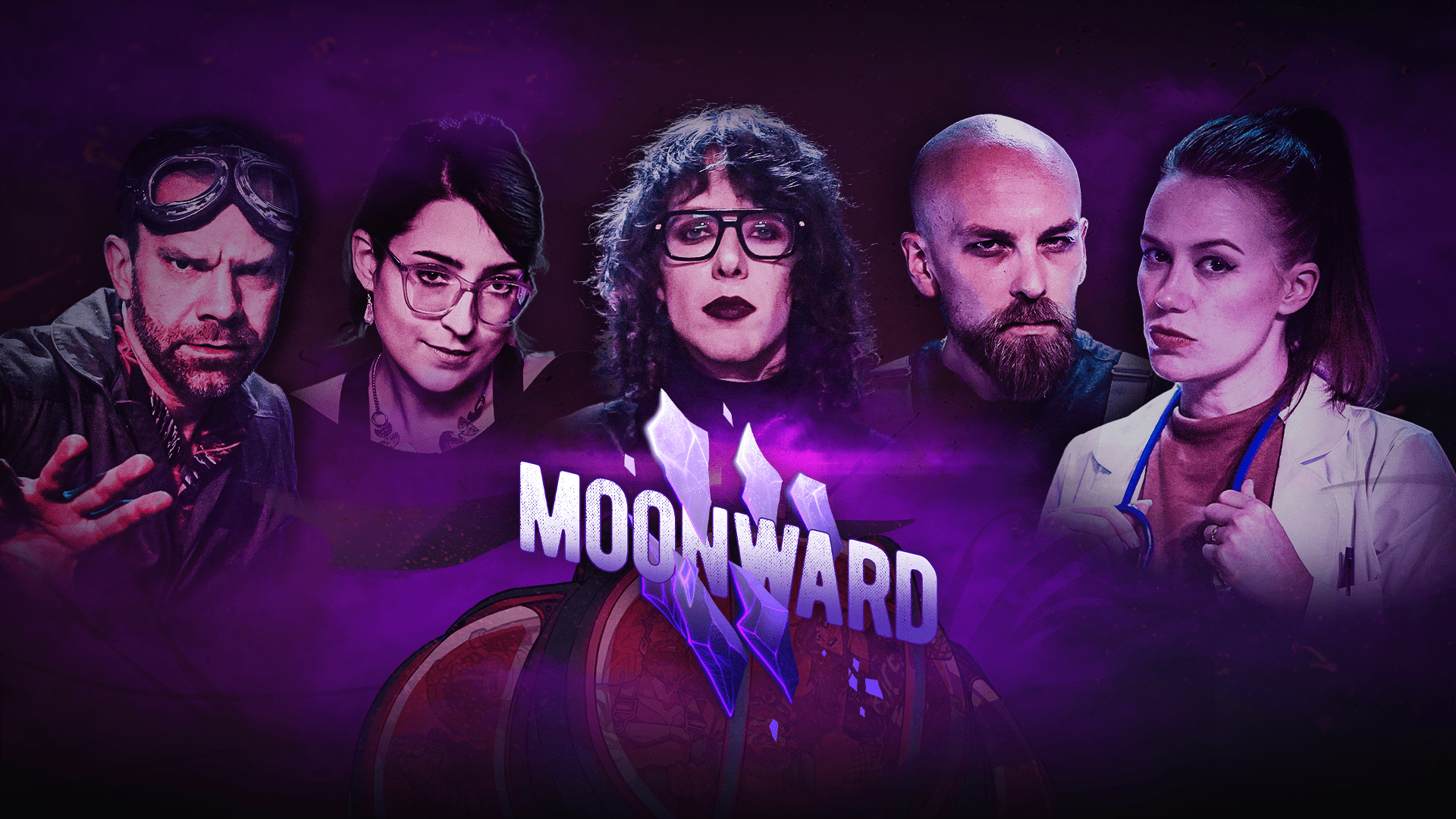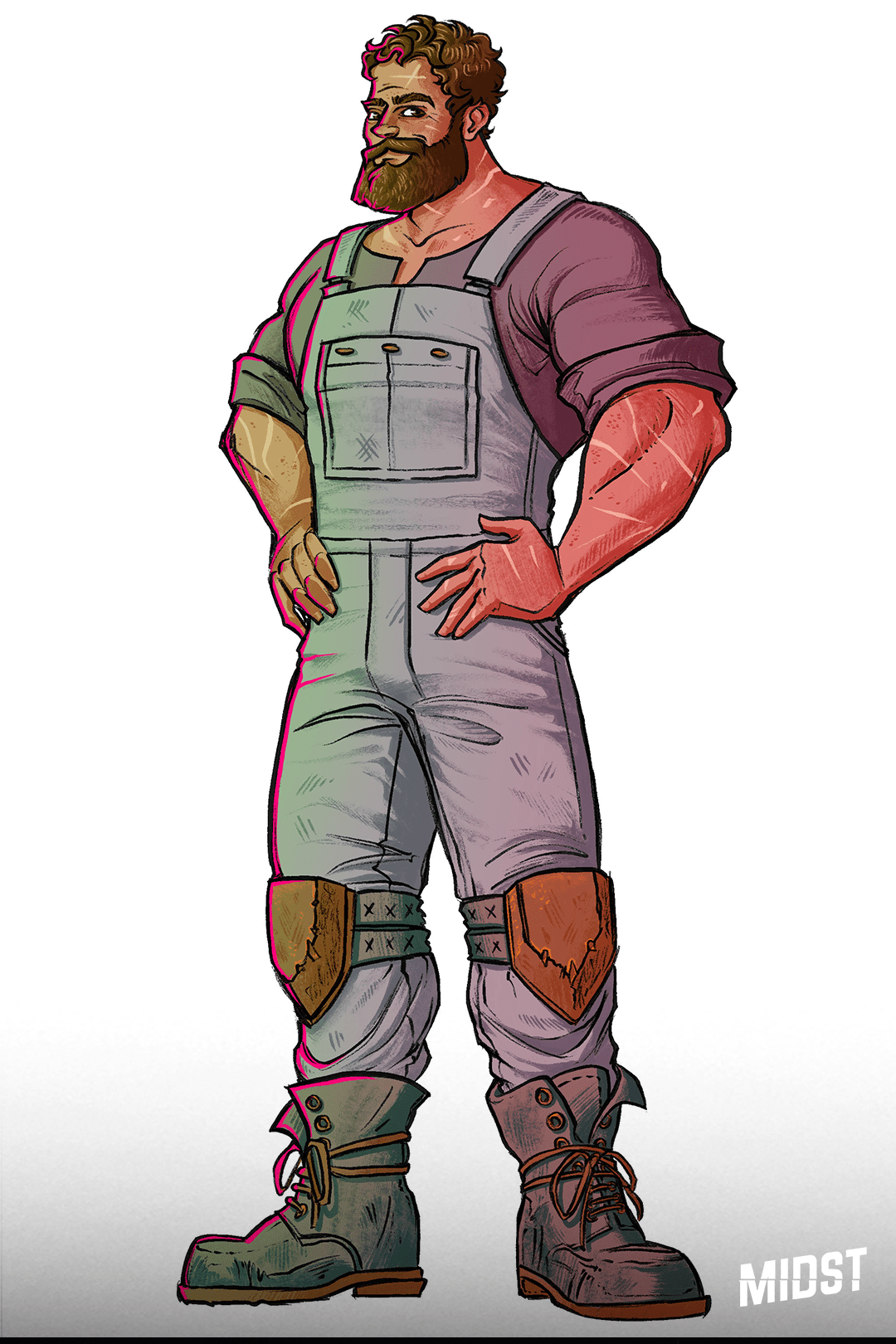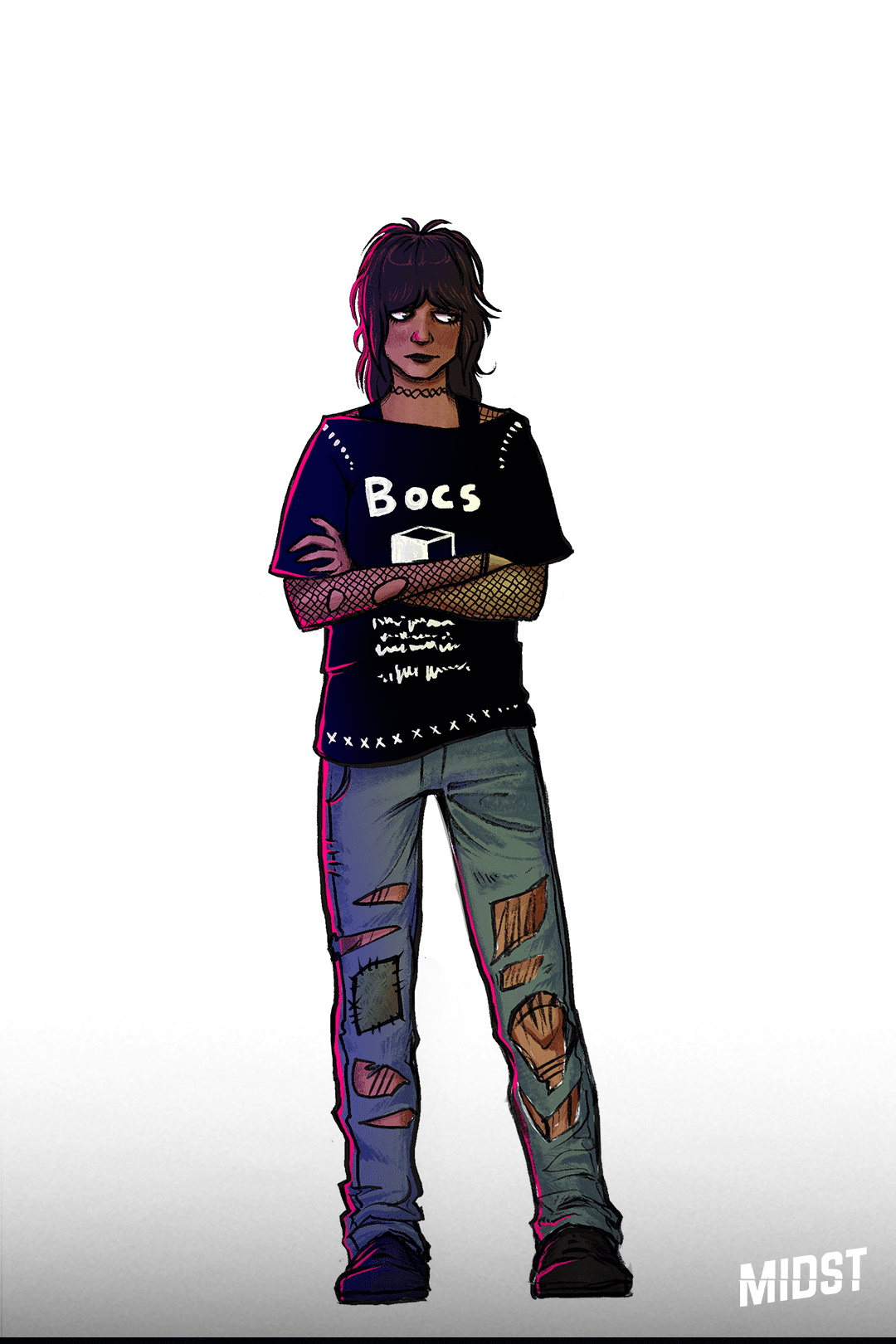This is a guest article by writer Gena McCrann, a freelance writer often losing a fight with a screenplay or a game pitch in New York.
The flagship series of the Midst cosmos, the eponymous Midst podcast, concluded this summer, but Third Person is still in the “midst” of this universe.
Debuting in January 2020 as a hobby project, the sci-fi fantasy narrative podcast was acquired by Critical Role Productions under their Metapigeon banner in early 2023. Third Person then began working on the podcast full-time, and the partnership increased the scale of the project dramatically: remastered and rereleased seasons, illustrated versions of episodes, comics from Dark Horse, and now a four-part miniseries Moonward: A Roleplaying Story. The trio imagined Midst as “more than a podcast”, and it’s certainly grown well beyond an audio drama.

For Moonward, Sara Wile and Matt Roen of Third Person are joined by Critical Role’s Liam O’Brien and Marisha Ray in a search for what remains of Midst’s destroyed moon. The players are led by Xen, the third of Third Person and the series’ Guide Narrator, loosely comparable to a Game Master. Third Person formerly worked as an anonymous trio, and Moonward marks both the first filmed visual medium for Midst and the first de-anonymized work the trio is producing.
Moonward combines live audio, music, and lighting effects in a black box theater setting, and it is described in press releases as continuing “Midst’s legacy of experimental storytelling” as an immersive experience. At the same time that the series moves the cosmos beyond its original form, Moonward returns to the fount of Midst’s inspirations: tabletop roleplaying games is where this cosmos was born.
Even with this return to a gaming sphere, and though O’Brien and Ray are known for their work on the Dungeons & Dragons actual play series Critical Role, Moonward does not use a tabletop game system or a formal ruleset, only straightforward roleplaying and improv. The only rules are that of narrative and the logic of the cosmos Third Person created.
I spoke with the three persons of Third Person to talk expanding their cosmic horizons, collaboration, and hypothetical rock operas.
Q: The Midst cosmos is rapidly expanding. An impressive roster of artists and storytellers have come into this world with you for Moonward, the comic miniseries, and even to illustrate the original podcast. What has that experience and process been like to have so many creatives work alongside you in this cosmos?
Sara: Wonderful and challenging. We got to work with many artists that I’ve been fans of for years! But we didn’t create Midst with the foreknowledge that we would eventually have to tell an artist what a “tearror” should look like. I love the ambiguity and subjectivity of audio, so at times it can feel stressful to have to decide ONE way for something to look. Still, it’s an incredibly lucky problem to have. Ultimately we’re just giving your imagination more options. A whole buffet of interpretations to snack on!
Matt: Midst has always been about collaboration, and it’s been such a thrill and SO humbling to connect and work with SO MANY incredible folks throughout these permutations! I am truly in awe at the care and craft that have been brought to each, but also the FUN of it all: Play is so much more fun and meaningful with friends, and there’s no comparison for the cooperative experience of creation.
Xen: It continues to be totally amazing and mind-bending to us that Midst has expanded beyond the three of us messing around in a living room together, and that so many talented artists, creators, and multimedia pros are now bringing all their elite skills to the process of taking Midst to the next level. It’s truly incredible and we can’t thank the entire immediate and extended Critical Role Midst squad enough for all they’ve done to help launch our strange sci-fantasy space-Western storyverse further out into the cosmos.
Q: Moonward pushes not just Midst into new territory, it’s done the same for yourselves as creatives. You’ve gone from needing sunglasses to avoid eye contact while recording audio to performing together on camera for Moonward. How has the experience of moving into a filmed visual medium for the first time been for you as performers in light of that?
Sara: It’s exciting, but also a very vulnerable feeling. Being perceived is scary enough in real life, never mind on the internet in front of an invisible colosseum of strangers. I’ve always been much more comfortable standing behind my art than in front of it. That said, everyone at CR was super supportive and did so much to help us feel at home. I don’t know if I’ll ever get used to seeing my face on YouTube, but the actual real activity of playing make-believe in a physical space with Xen, Matt, Liam, and Marisha felt like an incredibly natural and joyous experience. That’s how I’ll remember Moonward. It just happened to be filmed!
Matt: It is a surreal exercise — to be sure. Thankfully, this isn’t a trail we’ve had to blaze completely on our own: CR has been with us every step of the way, and a little Hollywood magic can make even the shyest of shadowy weirdos look pretty cool on camera (thanks due to Dre [Ronayne]’s incredible makeup skills, thank you Dre, we love you).
Xen: It’s a change that’s definitely taken some getting used to (and I think I speak for all three of us at Third Person when I say we’re very much still not done getting used to it). As shy, anonymous narrators there was a certain degree of protective distance between us, the work, and the audience that we felt comfortable existing within. Now that we’re visible as public individuals and have revealed our names as well as our faces, there’s a whole new intensity to our connection to the work (and its fans) that’s both exciting and intimidating.
Q: You’ve all talked in the past about making Midst more than a podcast, and Moonward is certainly not a podcast. Live music, an atmospheric set, dynamic lighting cues, additional cast in Marisha Ray and Liam O’Brien — all new elements to play with in Moonward. How has this miniseries and these new options it afforded you worked toward this goal of making Midst more than simply an audio drama?
Sara: We’ve been gaming way longer than we’ve been making podcasts, so it was really fun to have the opportunity to go back to basics with Moonward. That sounds silly to say, because sitting in Critical Role‘s soundstage with fog machines and fancy lighting and electric guitars is anything but basic. But playing make-believe with friends? That’s our comfort zone, really. And hopefully we’ll intrigue some new people that wouldn’t have given Midst a chance otherwise.
Xen: Before it was an audio drama podcast, Midst was originally an experimental TTRPG that the three of us at Third Person created and ran for each other. Midst‘s narrative style and collaborative delivery is born out of those gaming origins, and returning to the Midst cosmos in the format of a tabletop experience with Critical Role felt like slipping back into very familiar territory.
Matt: Can I get a little Whoa Dude for a minute? As humans, I believe we have a responsibility to tell stories to one another. Stories help us see the world from other points of view. They enable us to discover empathy, learn new things, and codify important moments. Stories enable us to explore worlds and perspectives outside of our own heads, and because stories (even the fictitious ones) are about life, and living it, why limit them to a single format? Life is rarely just what we see on a screen, or on a page. It doesn’t end when you sit down at a game table: it is part of the texture of the game. Audio drama is a classic, accessible, and easily reached-for medium to tell stories, and it succeeds (I think) because it is fulfilling that responsibility. In the same way that the more you explore the world, the better the world is for it: so too can storytelling improve when multiple storytellers weave a tale together.
Q: Is there anything that Moonward allowed you to explore, narratively or creatively, that you could not in the Midst podcast (due to time constraints, limitations of the audio medium, open to you now because of your growth as artists, and so on) that’s been especially exciting for you?


Xen: As much as I love making audio drama podcasts, I love playing and running TTRPG games even more — so taking the Midst storyverse into the realm of collective tabletop storytelling was pretty magical. I’m always in favor of maximum improv, unpredictability, and spontaneity in storytelling, and spinning a live Midst story on-camera with everything happening truly in the moment was a blast. Making an audio drama is a fairly ponderous technical process that I would not describe as particularly organic or spontaneous. Running and playing a systemless story-game, on the other hand, is an explosion of instant extemporaneous adventure that unfolds literally before your eyes as everyone lives in the moment together, carrying the story forward as a group. Moonward has a lively theatrical energy that has been an exciting change of pace after many years of audio drama production on the original Midst podcast.
Sara: I was happy for the opportunity to flesh out unknown or barely-known members of the Stationary Hill community. Kind of like Midst‘s [Star Trek:] Lower Decks. In a show as abbreviated as Midst, it could be hard to convincingly depict a whole town of people when we had to focus our limited time on the so-called protagonists, but I like to think that Stationary Hill is full of folks who are dealing with their own problems throughout the course of the main story, with lives just as rich and complicated as anyone else’s. Moonward felt like a great chance to show how the moonfall affected other people.
Matt: Agreed! A little perspective goes a long way, and seeing pivotal moments and characters from Midst with a different lens is something that personally excites me. Also the opportunity to infuse more physicality into a character: little gestures, light cosplay, subtle nods and looks that have to be narrated in an audio-only podcast can just HAPPEN instead.
Q: Does the idea of “more than a podcast” mean the same thing that it did before 2023 (before the project was acquired by Metapigeon)? Has anything in that idea and your relationship to it as a goal changed at all now that Midst has swiftly grown into a multimedia series?
Sara: To me, “more than a podcast” isn’t really a goal so much as an explanation. Midst wasn’t conceived of as a podcast. It was just a big gangly art project that we happened to coax into the shape of a podcast, due largely to Xen’s convenient skill with audio and music. But we found excuses to include illustrations, ads, menus, textbooks, letters, etc., because Matt and I had other skills and passions to bring to the table, and because each of those mediums are like different windows we can poke through into the cosmos to show you a slightly different angle on it. Before, we were limited to what we were personally capable of making. Now, there are so many more doors open to us, so it’s more a matter of prioritizing.
Matt: Because we set out to share a story with some friends, I think it’s safe to say that the idea of “more than a podcast” has been DEEPLY altered since pre-2023. “More” extends now to lorekeepers, comic book writers, artists, fog-wafters, photographers, propmasters, gaffers, producers, and beyond! It’s been SUCH a thrill to see this project grow and expand, and involve more excellent creativity from some truly fabulous friends.
Xen: If anything, the expansion of the Midst cosmos into new media formats has just reinforced for us the correctness of that original mindset. It’s a lot of fun to expand the storyverse in new ways, try new things, and see what kinds of varied Midst tales can unfold via different media. Each format presents a new and different way of experiencing the cosmos, and we continue to be excited about exploring more of those different avenues in the future.
Q: Beyond the setting, what makes a project Midst-y? Is it a vibe, a methodology, something else? What do you feel is the core element that something like Moonward or any other project needs to feel like a Midst work?
Sara: Ultimately I think this is a question for others to answer; I’ve always had a really hard time clearly seeing my own work. It’s much easier to analyze someone else’s stuff. But if I have to give an answer? I hope the one thing that makes something feel Midst-y is just a palpable enjoyment of fiction. Making stuff up is FUN. Storytelling is FUN. Playing with established tropes and conventions is FUN. We’re just here to mess around and try things, and it’s so cool that other people are enjoying it.
Matt: Sure, we have a “canon”, and internal cosmological logics that contribute to the flavors of Midst, but in the end I think it’s about telling a story that knows it’s a story, and having fun with it along the way.
Xen: While there are surface-level cosmetic things that I’d say make things generally Midst-y (meta-narrative experimentation, surrealism, trippy music, zany wordplay, a strange recurring emphasis on incomprehensible delivery methods for bread, etc.), I’d say a core element of our Midst stories to date has been an exploration of characters on essential journeys to find themselves, to discover their true natures, to confront voices and feelings within themselves that are literally and figuratively gnawing at their souls. Midst characters are often on powerful and irrevocable journeys, rising above darkness or descending into it, and I think personal voyages to confront, defeat, or accept inner demons (and know the person who really lives within you) are pretty fundamental to Midst.
Q: Forget what’s reasonable and grounded. Are there any other pie in the sky ideas for this cosmos in your minds? This is that rock opera mentioned on the official Tumblr earlier this year territory. What is your long-shot, having it all, wildest dream project that you’d create in this universe if given the chance?
Xen: If anything were possible, I’d like to collab with some world-class video game developers and build Stationary Hill in VR. I want to explore the town, stroll those space Western boulevards, and grab a booth at the Black Candle Cabaret!
Sara: Haha, the rock opera was my answer and I’ll stand by it! But let’s go further than a concept album. Theater would be a great art form for Midst. It can be both dead serious and unbelievably silly, and it’s perfect for fourth-wall-breaking and audience interaction. Midst knows it’s a podcast, and it would know it was a stage production too. It would have gigantic scary puppets. Valor and Caenum would rain from the ceiling. The audience would be full of plants who would suddenly start a flash mob during the big tearror scene. The Tripotentiary costumes would cost a million dollars each to produce. The first 10 rows of seats would be a designated “splash zone.” The theater would be a nightmare to clean afterwards. I haven’t thought about this for years at all.
Matt: Bahaha, I’m a HUGE fan of the hypothetical rock opera. It’s a good reason to get serious about drum lessons! And to be honest, ANY visual depictions of the Midst Cosmos are always the most magical to me — how people can just MAKE a picture? Of something that doesn’t exist??? Like. How did you do that!? (It’s magic is what it is.)
Q: There’s so much to talk about and only so much time, so: is there anything I haven’t asked about that I should have because you really want to talk about it?
Sara: My very favorite type of praise that I see for Midst is anything along the lines of “this inspired me to keep writing/drawing/crafting/etc.” That’s basically the highest compliment I can imagine. Creatively-inclined people spend a lot of time doubting ourselves and comparing ourselves to others. Some art can even make me feel anti-inspired, like what’s even the point of trying if other people are already better than I’ll ever be? If we’ve managed to entertain people AND encourage them, that makes me feel like I’m doing something good other than just amusing myself.
Matt: AGREED. Hearing that Midst has helped folks to get out of a dark place, or inspired them to create something of their own with their friends is mind-boggling. I also want to say THANK YOU! Thank you for these splendid and thoughtful questions! And thank you to all the readers for following along with these zany adventures!
Xen: I’ll extend my usual feverish invitation to present and future enjoyers of Midst: please do consider listening to Midst (and watching Moonward) with headphones if you don’t currently do so! Both shows are quite literally produced with stereo headphone listening foremost in mind, and you’re missing out on a massive portion of the experience if you tune in without headphones. Please give it a try! We think you’ll enjoy what you hear.
Stay tuned for more info and analysis of Midst Moonward, and check out our recent review of the series here.
Images via Midst and Critical Role
Have strong thoughts about this piece you need to share? Or maybe there’s something else on your mind you’re wanting to talk about with fellow Fandomentals? Head on over to our Community server to join in the conversation!

